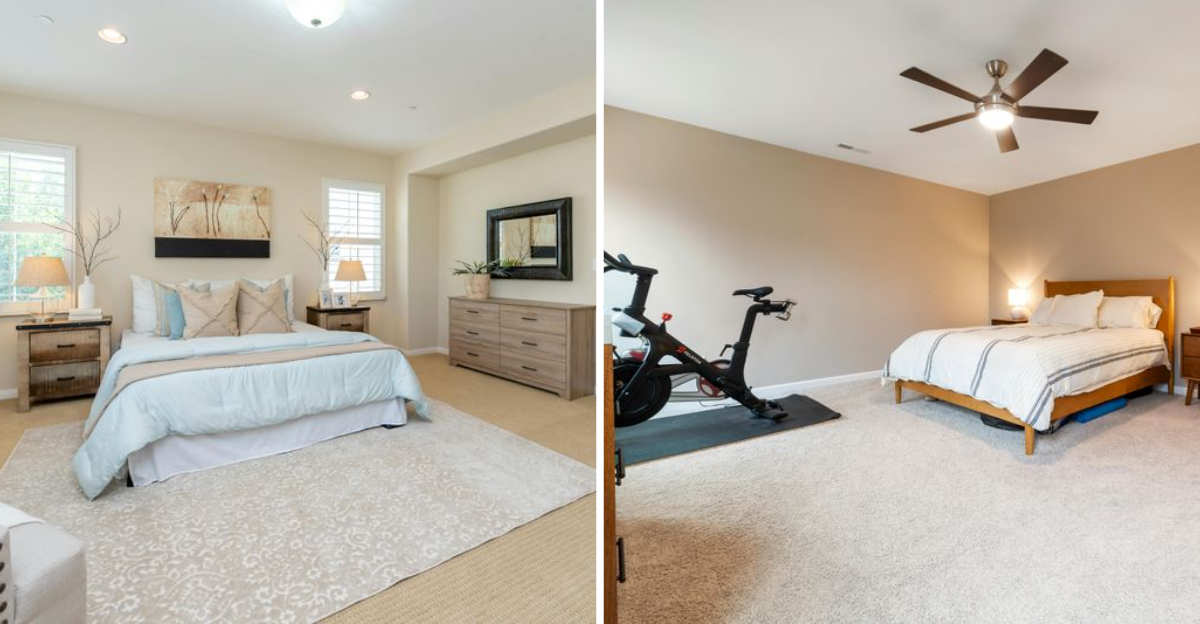9 Things Professional Organizers Say You Should Remove From Your Bedroom Now

Your bedroom should feel like a peaceful retreat a place to unwind and recharge after a long day. Yet many of us fill this space with items that create clutter, stress, or even disrupt sleep.
Professional organizers often point out that removing certain objects can instantly make your bedroom calmer and more restful.
While every space is unique, these insights offer general guidance that you can adapt to your room’s size, layout, and lifestyle.
1. Old Clothes You Never Wear
If you’re holding onto jeans from five years ago hoping they’ll fit again someday, it’s time to let them go. Your closet shouldn’t be a time capsule of fashion mistakes or wishful thinking. Professional organizers say that keeping clothes you don’t wear creates visual chaos and makes getting dressed each morning unnecessarily stressful.
When your closet is packed with items you never touch, finding what you actually love becomes a daily struggle. I recommend sorting through everything and being honest about what truly fits your current life and style.
Donate or sell pieces in good condition, and recycle worn-out items. You’ll feel lighter and more organized instantly.
2. Exercise Equipment Gathering Dust
Did you know that treadmill in the corner has probably become the world’s most expensive clothes hanger? Many people buy exercise equipment with the best intentions, then never use it. Keeping bulky workout gear in your bedroom takes up valuable space and serves as a constant reminder of abandoned fitness goals.
This visual guilt can actually increase stress rather than motivate you. Professional organizers suggest moving equipment to a dedicated workout space or selling it to someone who’ll actually use it.
Your bedroom needs to be associated with rest and relaxation, not failed New Year’s resolutions. Clear the space and reclaim your peace of mind.
3. Work Documents and Office Supplies
It’s impossible to fully relax when your bedroom doubles as your home office. Seeing work documents, files, and your laptop before bed keeps your mind in work mode, making it difficult to transition into rest. Professional organizers emphasize that your bedroom should have clear boundaries separating work life from personal life.
Even if you live in a small space, find another corner of your home for work-related items. A living room desk or kitchen table works better than mixing business with sleep.
When you remove these reminders of deadlines and responsibilities, your bedroom becomes a true escape from daily pressures.
4. Collections of Decorative Pillows
How many pillows do you toss onto the floor every single night before climbing into bed? While decorative pillows can look nice, having too many creates unnecessary work and clutter. Professional organizers point out that if you’re spending time each evening removing pillows and each morning replacing them, you’re wasting energy on a purely aesthetic choice.
Limit yourself to two or three pillows maximum that serve both decorative and functional purposes. Choose ones that actually support your sleep rather than ones that just look pretty in photos.
Simplifying your bedding routine saves time and reduces visual clutter that can feel overwhelming.
5. Books You’ve Already Read
Though books are wonderful companions, keeping every single one you’ve ever read turns your bedroom into a library rather than a restful space. Professional organizers suggest keeping only current reads or meaningful favorites on your nightstand, while storing or donating the rest.
Stacks of finished books collect dust and create visual clutter that makes the room feel cramped and disorganized. Be selective about which books truly deserve bedroom real estate.
Move completed books to living room shelves or donate them to local libraries where others can enjoy them. Keep your bedroom collection small and intentional for a cleaner, calmer atmosphere that promotes better sleep.
6. Unused Furniture Pieces
When was the last time you actually sat in that chair in the corner? Chances are it’s become another surface for piling clothes rather than serving its intended purpose. Professional organizers often find that bedrooms contain furniture that looks nice but serves no real function in daily life.
Extra chairs, unused desks, or redundant storage pieces make rooms feel cramped and harder to clean. Evaluate each furniture item honestly and ask whether it truly enhances your bedroom experience.
Removing unnecessary pieces opens up floor space, improves traffic flow, and makes your bedroom feel more spacious and breathable. Sometimes less really is more.
7. Laundry Piles and Dirty Clothes
Are dirty socks and worn shirts scattered across your bedroom floor becoming part of the décor? Allowing laundry to pile up creates unpleasant odors, attracts dust, and makes your bedroom feel chaotic rather than peaceful. Professional organizers stress that your bedroom shouldn’t double as a laundry holding area.
Establish a system where dirty clothes go directly into a hamper, and when it’s full, laundry gets done immediately. Don’t let clothes accumulate on chairs, floors, or bed edges.
A clutter-free bedroom starts with simple habits like putting clothes where they belong. You’ll breathe easier and sleep better in a fresh, clean space.
8. Sentimental Items and Memorabilia
While treasured memories deserve respect, your bedroom shouldn’t become a museum of your entire life history. Professional organizers find that excessive sentimental items create emotional weight and visual clutter that prevents true relaxation. Old trophies, childhood mementos, and countless photos covering every surface can feel overwhelming rather than comforting.
Select your most meaningful treasures and display them thoughtfully in other areas of your home. Store remaining items properly in labeled boxes rather than leaving them scattered around your sleeping space.
Your bedroom should reflect who you are now, not just who you used to be. Creating this balance helps you rest easier.
9. Food, Drinks, and Eating in Bed
Though midnight snacks feel tempting, keeping food and drinks in your bedroom invites problems. Crumbs attract pests, spills create stains, and lingering food odors aren’t exactly conducive to quality sleep. Professional organizers warn that eating in bed also creates unhealthy associations between your sleeping space and food consumption.
Old coffee mugs, water bottles, and snack wrappers scattered around make your bedroom look messy and feel less relaxing. Make it a rule to eat in the kitchen or dining area instead.
Keep only one fresh water bottle for nighttime hydration, and remove it each morning when you make your bed.






